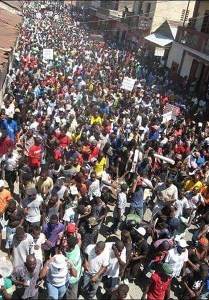
|
January 7, 2017 - No. 1 For a Modern
Canada that Recognizes
• Make 2017 a
Year of Great Advance for the New Year 2017 For a Modern Canada that Recognizes
|
For more information, contact
office@cpcml.ca
To donate by mail, send cheque or money order payable to: MLPC
Send to: P.O. Box 666, Postal Station C, Montreal, Quebec H2L 4L5
Please include full name and address for contributions over $20, as required by electoral law. The MLPC will issue a receipt for tax purposes which enables the donor to receive a tax credit. The maximum contribution to a registered political party permitted by law in 2017 is $1,550.00.
58th Anniversary of the Triumph of the Cuban Revolution
Cuban People Stand Firmly with Their Revolution
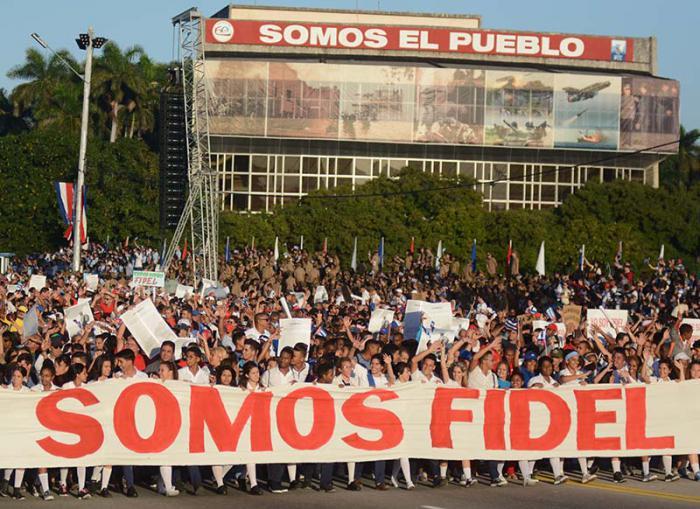
The Communist Party of Canada (Marxist-Leninist) joins the Cuban people and people of all countries in celebrating the 58th anniversary of the triumph of the Cuban Revolution. The Cuban people are entering this new year of their socialist nation-building project undefeated and standing firmly with their Revolution.
 On the occasion of this
important anniversary, CPC(M-L)
sends
militant revolutionary greetings to Comrade Raúl Castro,
who is leading Cuba to achieve the aims it has set and uphold the
principles that have strengthened and defended the Revolution
amidst a complex and difficult situation, and to the Cuban
people, who call the Revolution their own and who, with their
outstanding achievements, have shown the peoples of the world the
meaning of the word dignity. CPC(M-L) also reiterates its
profound condolences to Cuba's government and people on the
passing of Comrade Fidel Castro, the legendary historic leader of their
Revolution, and expresses its total confidence that the Cuban
people -- who have taken up the battle cry "We are Fidel!" -- are
well armed with his example to continue to defy all impediments
and to meet any challenge.
On the occasion of this
important anniversary, CPC(M-L)
sends
militant revolutionary greetings to Comrade Raúl Castro,
who is leading Cuba to achieve the aims it has set and uphold the
principles that have strengthened and defended the Revolution
amidst a complex and difficult situation, and to the Cuban
people, who call the Revolution their own and who, with their
outstanding achievements, have shown the peoples of the world the
meaning of the word dignity. CPC(M-L) also reiterates its
profound condolences to Cuba's government and people on the
passing of Comrade Fidel Castro, the legendary historic leader of their
Revolution, and expresses its total confidence that the Cuban
people -- who have taken up the battle cry "We are Fidel!" -- are
well armed with his example to continue to defy all impediments
and to meet any challenge.
Cuba enters this 59th Year of the Revolution, the first without its historic leader, as it works to make important breakthroughs in the renewal and consolidation of its socialist economy. The plenary session of Cuba's National Assembly of People's Power, convened at the end of 2016, has emphasized the need for all the working people to exercise discipline to ensure the efficient use of resources, particularly energy resources, as the economy resumes growth and attention is paid to the development of key sectors. Internationally, the collapse in commodity prices as well as the brutal, unremitting economic, financial and commercial blockade of the U.S. imperialists continue to harm Cuba's economic progress.
December 17, 2016 marked two years since the liberation of the Cuban Five from U.S. prisons and the reestablishment of diplomatic relations with the United States. That victory, and many since, come thanks to the commitment of the Cuban people to their principles, first and foremost of sovereignty and independence, in the face of decades-long attempts by the U.S. imperialists to starve them, crush their efforts to create a human-centred society and defeat the Revolution. This is the revolutionary commitment that will serve the Cuban people to prevail no matter what comes from the new U.S. administration that is taking power on January 20.
CPC(M-L) thinks that now more than ever, Canadians must go all out to demand an end to the U.S. blockade and the return of occupied territory in Guantanamo Bay to Cuba. Now is also the time to insist that Canada uphold a policy of non-interference in Cuba's internal affairs, and deepen the everlasting friendship between the Cuban and Canadian peoples.
Long Live Revolutionary Cuba!
(Photos: Granma)
58 Years of Revolution!
Fidel's Ideas and Example Live!
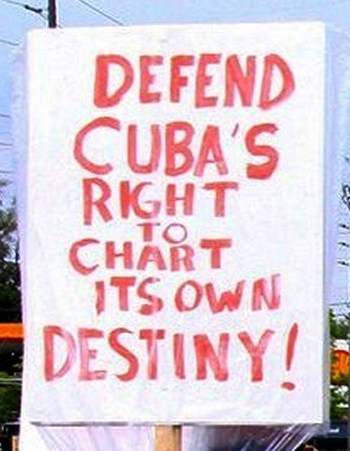 On the occasion of the 58th
anniversary of the triumph of
the Cuban Revolution, the Canadian Network on Cuba, on behalf of
the Canada-Cuba friendship and solidarity movement, extends our
warmest and most heartfelt greetings to the Cuban people, the
Cuban government and Cuba's revolutionary leadership. This
anniversary is especially poignant and bittersweet as it is the
first commemoration without the physical presence of Compañero
Fidel, the historic leader and founder of the Cuban Revolution.
Cuba's President Raúl Castro observed that while Fidel has left
us, "Fidel left undefeated."
On the occasion of the 58th
anniversary of the triumph of
the Cuban Revolution, the Canadian Network on Cuba, on behalf of
the Canada-Cuba friendship and solidarity movement, extends our
warmest and most heartfelt greetings to the Cuban people, the
Cuban government and Cuba's revolutionary leadership. This
anniversary is especially poignant and bittersweet as it is the
first commemoration without the physical presence of Compañero
Fidel, the historic leader and founder of the Cuban Revolution.
Cuba's President Raúl Castro observed that while Fidel has left
us, "Fidel left undefeated."
Fidel's example and fidelity to principle continue to inspire the Cuban people, who continue on the path of independence, self-determination and human dignity. On January 1, 1959, the people of Cuba led by Fidel Castro firmly took control of their destiny. The years since then are filled with the rich and profound illustration of what can be achieved when a country wins and defends its independence and exercises its right to self-determination. Despite all efforts of the empire to bring Cuba to her knees, the resilience and determination of the Cuban people to defend the independence and dignity of their homeland, which is the basis of their own freedom and dignity, has prevailed time and time again.
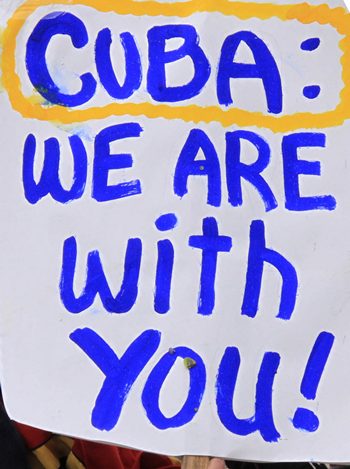 Today, the Cuban people
continue to renew their Revolution, a
living example that it is possible to build societies based on
social relations of genuine solidarity and social love. We are
confident that the Cuban people will continue to prevail,
overcoming all the challenges and difficulties they face.
Today, the Cuban people
continue to renew their Revolution, a
living example that it is possible to build societies based on
social relations of genuine solidarity and social love. We are
confident that the Cuban people will continue to prevail,
overcoming all the challenges and difficulties they face.
As the Cuban people confidently march forward, the CNC reaffirms its commitment to strengthen and deepen the ties of friendship and solidarity between the peoples of Canada and Cuba, resolving to do the utmost to defeat the U.S. economic blockade of Cuba, end Washington's ongoing campaign of subversion and ensure the return to Cuba of the illegally occupied territory of the U.S. naval base at Guantánamo Bay.
¡Viva la Revolución Cubana!
(December 31, 2016)
Mass March and Military Parade Commemorate
60th Anniversary
of Landing of Granma Expedition

José Martí Revolution Square in Havana on January 2 was filled for a Military Review and March of the Combatant People to commemorate the 60th anniversary of the heroic uprising in Santiago de Cuba and landing of the Granma expedition. The anniversary falls on December 2 and is marked as Revolutionary Armed Forces Day, but ceremonies were postponed until January 2 after the passing of the Leader of the Cuban Revolution, Fidel Castro Ruz. This year, the mass march was held in honour of Fidel and Cuba's youth. Displayed on a large banner in the background of the parade was the slogan Somos el pueblo -- "We are the people," while youth carried the slogan Somos Fidel -- "We are Fidel."
The march, beginning in the early morning, started with a 21-gun salute and the national anthem of Cuba. Then came a 128-strong cavalry unit representing the mambises, guerrilla fighters in Cuba's wars of independence against Spanish colonialism, followed by soldiers representing the militia that fought heroically at Playa Girón in 1961 where imperialism suffered its first defeat in the Americas and Cuba won a great victory.
 They were followed by 90
students from the Enrique José Varona University of Pedagogical
Sciences wearing the uniforms and carrying the lanterns of the
thousands of Cubans who took part in the historic literacy campaign of
1961, the 55th anniversary of which was celebrated on December 22.
They were followed by 90
students from the Enrique José Varona University of Pedagogical
Sciences wearing the uniforms and carrying the lanterns of the
thousands of Cubans who took part in the historic literacy campaign of
1961, the 55th anniversary of which was celebrated on December 22.
Next came a replica of the Granma yacht, on which 82 members of the revolutionary July 26 Movement, including Fidel, Raúl, Che Guevara and Camilo Cienfuegos traveled to Cuba from Mexico, landing on December 2, 1956 in what is now Granma province. The vessel appeared afloat on a sea of 3,000 student pioneers.
Another group of youth represented Cuba's internationalist fighters and their participation in the independence struggles of the peoples of Africa. The first part of the parade then concluded with members of the children's theatre company La Colmenita.
The review of the armed forces that followed featured representatives of the Revolutionary Armed Forces' three armies -- eastern, central and western -- as well as other commands marching in tight ranks.
Closing the march were members of Production and Defence Brigades, comprised of workers in various sectors and students in the University Militia. Behind them came youth, men, women and children who filled Revolution Square with unity and commitment to the Revolution and its Commander in Chief.
Reviewing the parade with revolutionary pride were
Raúl
Castro Ruz, First Secretary of the Communist Party of Cuba and
President of the Councils of State and Ministers; revolutionary
veterans; members of the National Assembly of People's Power and
Councils of State and Ministers; Susely Morfa González, First
Secretary of the Union of Communist Youth; and Jennifer Bello,
president of the Federation of University Students who spoke to
reiterate the declaration of Fidel, that "the Cuban people will
triumph."

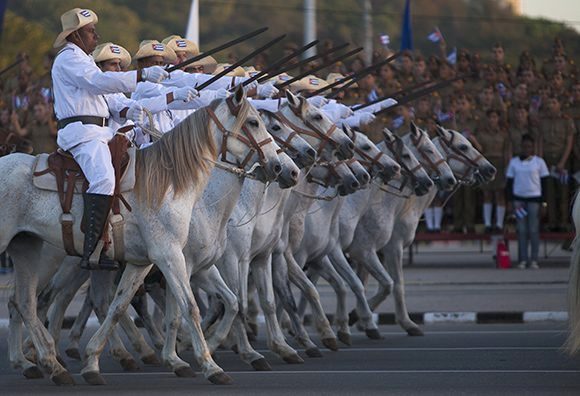

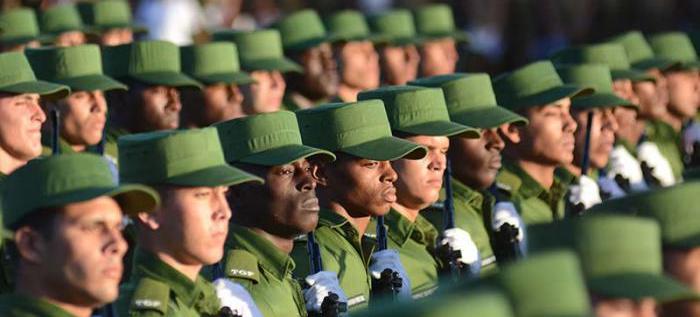

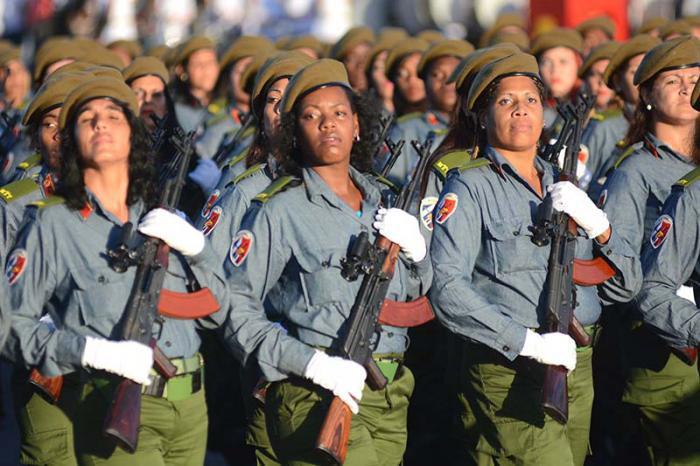
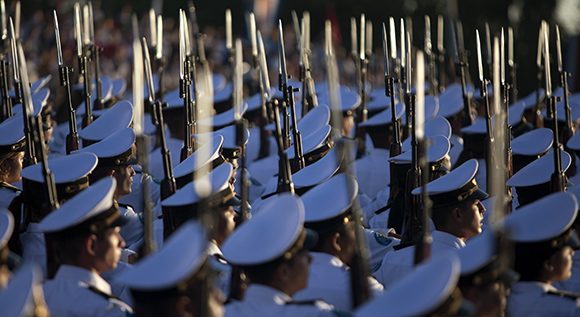



(Granma; Photos: Granma, CubaDebate)
Cubans Celebrate 55th Anniversary of
Historic Literacy
Campaign
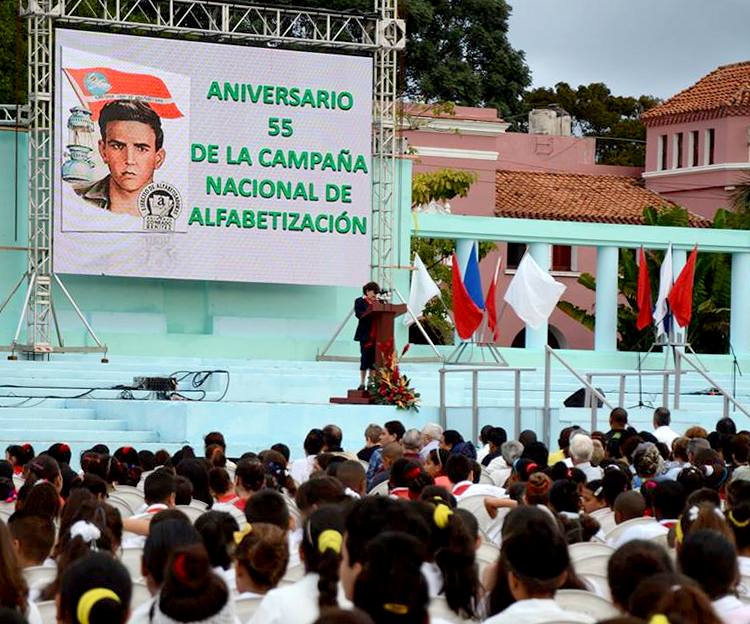
Cuba held its annual Educators Day celebrations on December 22, marking the 55th anniversary of the proclamation of Cuba as free of illiteracy. At Revolution Square in Havana on December 22, 1961 Comrade Fidel Castro declared, six months after Cuba defeated the CIA-sponsored invasion at the Bay of Pigs, that Cuba had also succeeded in this battle. One year before, during his first speech before the United Nations General Assembly, Fidel declared that Cuba would soon be the first country in the Americas to be fully literate.
Cubans marked the anniversary of this historic achievement with a ceremony in the former Ciudad Libertad educational complex, a military base prior to the Revolution, presided over by First Vice President and member of the Communist Party's Political Bureau, Miguel Díaz-Canel Bermúdez. The event put particular emphasis on the decisive role played by Fidel, the country's greatest teacher, in mobilizing the people and inspiring them to educate all of Cuba.
Zoila Benítez spoke in the name of the thousands
of volunteer
teachers who participated in the campaign and recalled that Fidel
"charted the campaign's strategy guided by the principles of
national unity, massive availability of culture, and confidence
in Cuba's youth." José René Fuentes Cintado, who learned
to read
and write during the campaign, said, "There is nothing more
alienating than being unaware of the things that happen around
us, not knowing the reasons behind each one. We were born to a
mother called literacy in 1961, a product of another even more
beautiful one, the undefeated, glorious Cuban Revolution."

Cuban literacy workers celebrate the completion of the historic
campaign, December 21, 1961.
In a December 27 article in Granma, Yenia Silva Correa wrote:
"What did it mean for a small country like Cuba to eliminate illiteracy in just one year, with a massive, popular campaign? What changes did learning to read and write bring to the lives of illiterate individuals? What would have been the country's fate if the effort had not be made?
"No one doubts that undertaking such an ambitious effort would not have been possible without the nascent Revolution. The campaign not only taught reading and writing, but served as well to dignify the noble vocation of teaching, and transformed the foundation of national life by guaranteeing access to education for all. [...]
"Universal literacy was considered a key task for the country, among those outlined in the Moncada program, and once the Revolution triumphed, January 1, 1959, Fidel's idea was put into action. The 1961 academic year was ended early in April, so that students could participate in the campaign.
"Volunteer literacy teachers in the Conrado Benítez Brigade, named in honor of the young man killed by counterrevolutionaries, and the Homeland or Death contingent, took their manuals and kerosene lamps across the nation. Along with those who trained the literacy teachers, more than 250,000 individuals, mostly very young, participated.
"There were ten other young teachers who gave their lives during the noble effort, killed by opponents of the Revolution, the most well-known being Manuel Ascunce Domenech.
"Cuba has shared with Venezuela, Bolivia, Nicaragua, and peoples of other latitudes the value of eliminating illiteracy, offering collaboration with experts from the country.
"The more than 700,000 Cubans who learned to read and write, especially for those well into adulthood, literacy provided the opportunity to take control of their lives. [...]
"As is the case in all revolutionary processes, youth did not hesitate to take the lead in 1961, a year that is significant in Cuban history not only because of the literacy campaign, but also for the victory at Playa Girón, the first military defeat of imperialism in Latin America. [...]
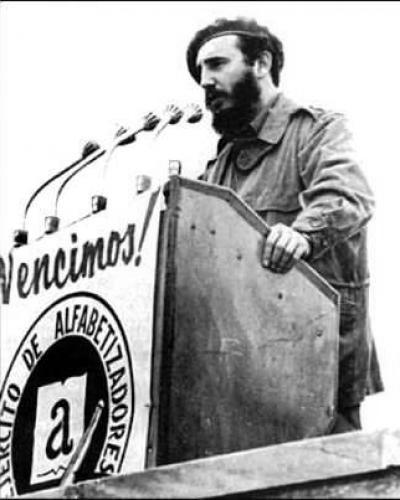 "It is impossible to
separate the literacy campaign
from the
figure of Fidel, since he conceived it, organized, and led it,
opening up opportunities for young people at the time, asking but
one thing in return: that they study.
"It is impossible to
separate the literacy campaign
from the
figure of Fidel, since he conceived it, organized, and led it,
opening up opportunities for young people at the time, asking but
one thing in return: that they study.
"In his unforgettable speech of December 22, 1961, in Havana's Plaza de la Revolución, Fidel declared, 'The young have the world, the future, in their hands,' and it was these young people, who risking their own lives, went out to teach.
"The literacy campaign changed minds and lives, and established the principles that would guide Cuban education all these years, while providing experience that would lead to the development of the 'Yes, I can' literacy method, used by millions around the world to become literate.
"Thanks to the literacy campaign, as well, is the human capital the country has developed to make the Revolution's achievements possible, and produce the high level of education the country's citizens enjoy.
"The generation responsible for eliminating illiteracy
can be
proud of having written one of the most altruistic chapters in
the history of Cuba."
(Photos: Granma, L. Noval)
National Assembly of People's Power
Holds Plenary Session
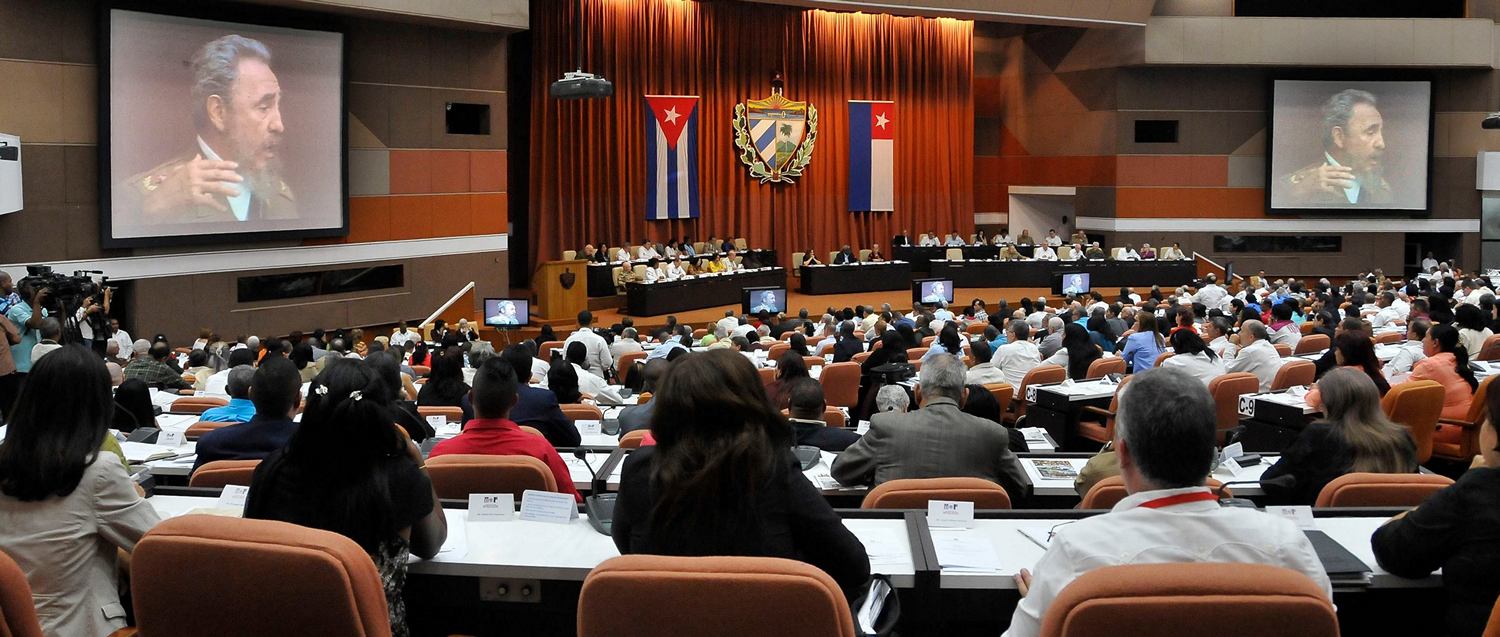
Cuba's National Assembly of People's Power held a plenary session beginning December 26 to discuss and approve the country's 2016 economic performance report, proposed economic plan, and projected State Budget for the coming year. More than 550 members of the Assembly took part in the session. The plenary session was presided over by Army General Raúl Castro Ruz who also gave the main report. Nine new deputies formally assumed their duties with the opening session on December 26. These included Susely Morfa González, First Secretary of Cuba's Union of Communist Youth (UJC).
The session opened with a tribute to the most loyal defender of people's power, Commander in Chief Fidel Castro. The President of Cuba's National Assembly and deputy from Santiago de Cuba since the Assembly was founded in 1976, Esteban Lazo Hernández told deputies that the tribute to Fidel presents an occasion for all to reflect on what the concept of Revolution means to them. "Let us think about every one of these fundamental reflections which, we are called upon to fulfill day by day, with a firm and lasting commitment," Lazo said.
Deputies also approved a law prohibiting the use of the name and likeness of Fidel "to denominate institutions, plazas, parks, streets, avenues and other public places, as well as any type of decoration, recognition or honorary title," prohibiting the use of the name or image of Fidel for advertising or commercial purposes, or "to erect monuments, busts, statues, commemorative strips and other similar forms of homage" according to his wishes. An exception was made for a future institution which would study the indispensable role of Fidel in the development of the Cuban nation. Likewise, the law does not limit the use of Fidel's name or image in artistic and literary production.
Focus on the Economy and Guaranteeing the People's Well-Being
Deputy Lina Pedraza Rodríguez, Minister of Finances and Prices delivered the report on the proposed 2017 State Budget law, which legislators discussed with an emphasis on efficient use of energy resources and development of renewable energy. Deputy Alfredo López Valdés explained that a dozen wind farms will be developed throughout the country by 2030, in addition to existing solar and hydroelectric facilities and generation of electricity using organic waste. López noted that conservation of energy presents the greatest challenge in the coming year, including reducing electricity usage at peak times.
Various deputies elaborated the need for the whole society, including workers and representatives and presidents of People's Councils to play a significant role in the detection of irregularities in the workplace in the management of resources in construction, transport, and agriculture. Delegates repeatedly emphasized the importance of rigorous audits, and the fact that Cuba is making every effort to avoid impacting the access to electricity of residential facilities. Milagro de la Caridad Pérez Caballero, Deputy from Ciego de Ávila and a member of the secretariat of the Cuban Workers' Central (CTC) noted that daily tasks in each workplace must include conservation of resources, rational use of budget allocations and conscious attention to priorities.
Lazo Hernández, National Assembly President noted the need for concrete investigation into the cause of problems in workplaces, and when they are identified confronted as if in battle. Those responsible must be held accountable and be sanctioned if they do not fulfil their duties, Lazo said.
Orlando Celso García, deputy from Florida and President of the state sugar enterprise Azcuba reported that the industry expects to grow by 37 per cent in the coming year as a result of strategic efforts to lower costs, including in reducing fuel consumption rates. He also emphasized the importance of savings being reflected in increased salaries for workers.
Agustín Lage, legislator from the municipality of Yaguajay called for more emphasis to be put on funding scientific and technological research. Minister of Science, Technology, and Environment Elba Rosa Pérez informed that the issue is being analyzed with the Ministry of Prices. Mirtha Millán, deputy from the Isle of Youth special municipality noted that despite economic difficulties the country will face in 2017, maintaining basic social services will be a fundamental premise.
(Granma)
Speech of President Raúl Castro to
National Assembly
Speech by Army General Raúl Castro Ruz, First Secretary of the Communist Party of Cuba Central Committee and President of the Councils of State and Ministers, during the Eighth Period of Ordinary Sessions of the National Assembly of People's Power VIII Legislature, in Havana's International Conference Centre, December 27, 2016, Year 58 of the Revolution.
***
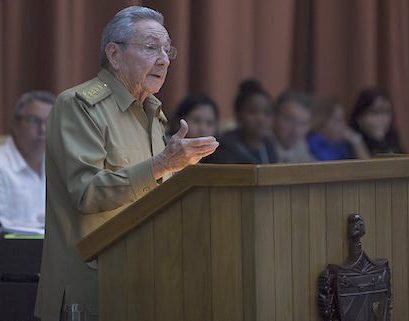 Comrades,
Comrades,
The last days of the year, as is customary, have been characterized by intense activity. This past Saturday [December 24], we held a meeting of the Council of Ministers, which approved for presentation to the National Assembly the 2017 Economic Plan and proposed State Budget, which we have analyzed here today.
Unlike previous sessions, on this occasion an evaluation of progress in the process of updating our socio-economic model was not conducted; taking into account that work continues on the proposed Conceptualization, and on the basic premises for the Social and Economic Development Plan through 2030; after concluding the thorough, democratic debate conducted with Party and youth organizations, representatives of mass organizations, and broad sectors of society, as mandated by the 7th Party Congress.
We hope that during the course of the first half of this coming year, the Central Committee Plenum will approve both programmatic documents.
During the [National Assembly's] ordinary session of December 2015, I warned that the performance of our economy in 2016 would face financial limitations as a result of a drop in revenue from exports, given reduced prices for the country's principal product lines, as well as the impact of changes in cooperation relations with other countries.
By July of the current year, these projections had been confirmed, about which I informed our people through this legislature. In fact, limitations in the supply of fuel and financial tensions worsened during the second half of the year, leading to a decrease in the Gross Domestic Product of 0.9 per cent. Despite this, our free social services, such as education and public health for the entire population, were preserved. Our economy did not collapse, nor did the black-outs we experienced in the most difficult moments of the Special Period return, as more than a few international media outlets predicted.
At the same time, amidst this unfavorable conjuncture, the country continued to meet obligations agreed upon as part of the restructuring of Cuba's foreign debt. Nevertheless, it has not been possible to overcome the temporary situation we face in regards to current payments owed suppliers. To address this, a series of measures were negotiated and implemented which will allow us to mitigate the panorama described.
I once again thank our commercial partners for their understanding and confidence in Cuba, and reiterate the government's intention to gradually re-establish normality in this important sphere, and lay the foundation to prevent its repetition in the future.
 As we refer to the
performance of the Cuban economy,
the
negative effects generated by the United States economic,
commercial, financial blockade, which, as you know, remains in
effect, cannot be forgotten. An example of this is that Cuba
continues to be unable to conduct international transactions
using the U.S. dollar, hampering progress in many important
prospective business opportunities.
As we refer to the
performance of the Cuban economy,
the
negative effects generated by the United States economic,
commercial, financial blockade, which, as you know, remains in
effect, cannot be forgotten. An example of this is that Cuba
continues to be unable to conduct international transactions
using the U.S. dollar, hampering progress in many important
prospective business opportunities.
Nor can we ignore the extensive damage caused by the powerful Hurricane Matthew that struck, with unusual violence, six municipalities in the far eastern region of the country, on October 4 and 5 of the current year, leaving a significant trail of destruction, affecting housing, schools, healthcare centers, warehouses, industrial and hotel facilities, as well as severe damage to highway, electrical, water supply and telecommunications infrastructure.
Fortunately, thanks to steps taken to protect the population, we were not obliged to mourn the loss of human life, as was sadly the case in other states located in the storm's path, including dozens of people within the very territory of the United States.
A much weaker hurricane comes to my mind, Flora, a category two, that on this date in 1963, 53 years ago, caused more than 1,200 human deaths. From that experience, several issues emerged, among them all the reservoirs we have -- barely four or five existed in the country previously -- and during this last hurricane, as I said, we didn't have a single death, not even a serious injury. We are working and will continue to do so.
I will take advantage of the occasion to offer thanks for the expressions of solidarity and material support we have received from many countries and international organizations in the United Nations system, contributing to recovery efforts in this region. Deserving of special mention is the help provided by the sister republic of Venezuela, on the initiative of its President, Comrade Nicolás Maduro Moros.
In regards to the 2017 plan and budget, I must warn that financial tensions and challenges persist, that may even worsen in some circumstances. Nevertheless, we project that the Cuban economy will retake an ascending path, and that the Gross Domestic Product will grow modestly, around 2 per cent.
Toward this end, three decisive premises must be respected. They are: guarantee the delivery of exports and their timely payment; increase national production to replace imports; and no less important, eliminate unnecessary expenses and use available resources rationally and efficiently. At the same time, amidst these difficulties, we will continue executing plans for investments directed toward the sustainable development of the national economy.
We afford great importance to the need to increase foreign investment in Cuba, in accordance with Guideline no.78 of the Economic and Social Policy of the Party and the Revolution, approved by the 7th Congress.
I acknowledge that we are not satisfied in this area, and that there have been frequent, excessive delays in the negotiating process. It is necessary to overcome, once and for all, the obsolete mentality of prejudices toward foreign investment.
To advance resolutely in this direction, we must rid
ourselves of unfounded fears of foreign capital; We are not
heading toward, nor will we head toward capitalism, this is
totally ruled out, as is established in our Constitution, and
will be maintained, but we should not be afraid, and erect
obstacles to what we can do within the framework of existing law.
This requires, in the first place, assuring the systematic
preparation and training of cadre and specialists to negotiate,
as well as analyzing deficiencies and mistakes made in the past,
to never again repeat them.


The Mariel Special Development Zone in Artemisa province features the
largest industrial park in the Caribbean and Central America,
established to facilitate increased foreign investment within the
renewal of Cuba's socialist economy.
As is known, this small island does not produce all the fuel it needs, having to import a considerable amount, the cost of which hangs like the sword of Damocles over our economy. Without renouncing an increase in the national production of oil, for which we need investors, we must accelerate the development of renewable energy resources, which currently only account for 4.65 per cent of the electricity we generate.
We have more than adequate conditions for this in terms of solar, or photovoltaic energy, wind and biomass. This is one of the strategic sectors in which we must decisively strengthen foreign investment.
Precisely these last two issues, which I am addressing, were also discussed in the last Council of Ministers meeting, a few days ago, along with maintaining, I said, the figure of 24 per cent, to which we aspire in the Plan through 2030 -- but, really, work to surpass this by that date.
Moving on to another subject, this morning the Assembly agreed to continue working, until the conclusion of the current legislature in 2018, on the experiment being conducted in the provinces of Artemisa and Mayabeque, directed toward separating the leadership of the Administrative Councils from that of the Provincial and Municipal Assemblies of People's Power.
This experiment, which has been underway for five years now, coinciding with the creation of the two provinces, has allowed for the implementation of a series of organizational and functional principles regarding government bodies, permitting local People's Power assemblies to increase attention to People's Councils, constituency delegates, and the population in general.
Likewise, it was possible to separate state functions from those of local enterprises, creating at a provincial level, a system of entities providing services to the people. All of this has helped significantly reduce staff and cadre rosters across management structures in provinces and municipalities.
Nonetheless, a number of shortcomings emerged which, without undermining the essential concepts of the experiment, prevented the consolidation of the management model implemented, so as to ensure its successful generalization across the rest of the country at a later date.
One of the main factors identified is the high level of instability of cadres in these bodies, as well as the inadequate completion of staff rosters, as a result of miscalculating the selection, training, and oversight of personnel. To this must be added insufficient attention and supervision by national entities and bodies to the experimentation process, thus delaying the implementation of the decisions adopted.
I believe that the errors have been identified and that the decision to extend the experiment is correct. Now, it is up to all of us and the Permanent Commission for Implementation and Development, in particular, together with Party structures in different bodies, to overcome these and advance, without delay, toward its completion in the new timeframe prescribed.
From the beginning, it was genuinely thought to be an easy task, and life is showing us that there is no easy task in this area, and that all the agreements to perfect the experiment are full of difficult tasks. Nothing is easy, we must dedicate the necessary time to everything, while none of these tasks can be successfully completed with superficialities and much less by addressing them every now and then.
Comrades,
In my remarks on December 3, in the Mayor General Antonio Maceo Grajales Plaza de la Revolución, in Santiago de Cuba, I announced the historic leader of the Cuban Revolution Fidel Castro Ruz's wish that his name and likeness never be used to denote institutions, squares, parks, avenues, streets, or other public sites, and that neither busts, statues or other similar forms of tribute be erected in his memory.
Today, our parliament has enshrined Comrade Fidel's last wishes in law.
The historic leader of the Cuban Revolution left us his enduring example, his unwavering optimism, and confidence in victory.
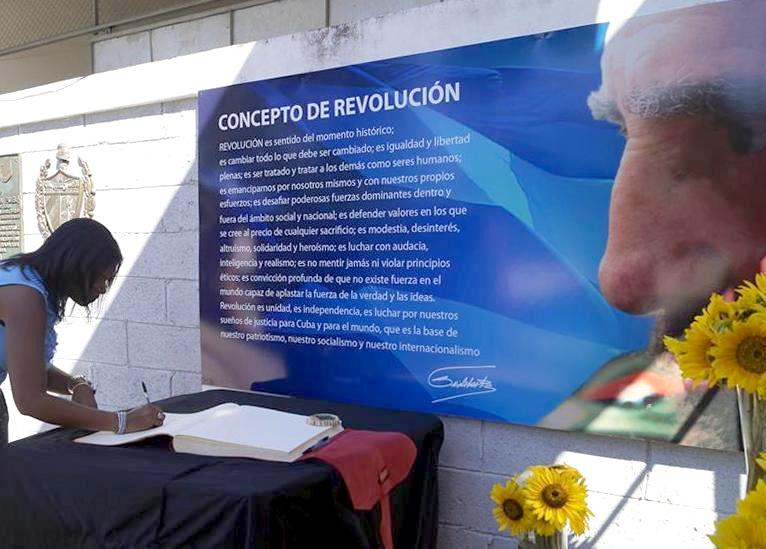 I believe, and just as
Comrade Lazo remarked at the
opening
of this session, that the best monument to his ideas and work is
to bring to life, every day, the postulates contained within his
outstanding definition of the concept of Revolution, which he
made public on May 1, 2000, and was signed by millions of Cubans
in the context of activities organized to pay well-deserved
tribute to a man who never betrayed his people, and just as he
expressed in the premonitory speech he delivered on January 8,
1959 -- on arrival to the capital, at the military camp formerly
known as Columbia, now Ciudad Libertad -- today almost 58 years
ago, when the Caravan of Liberty triumphantly entered Havana --
having left me in charge of the eastern province in Santiago de
Cuba, at that time the capital of what are today the five eastern
provinces, I watched his speech on television that evening. The
older ones will remember what it was like, very moving; with the
white doves perched on his shoulders, etcetera. I don't clearly
recall what I am going to read to you, but I do remember how it
began: "The feeling of joy is immense. And yet, there still
remains much to be done. We won't deceive ourselves by believing
that everything will be much easier from now on; perhaps it will
be much more difficult."
I believe, and just as
Comrade Lazo remarked at the
opening
of this session, that the best monument to his ideas and work is
to bring to life, every day, the postulates contained within his
outstanding definition of the concept of Revolution, which he
made public on May 1, 2000, and was signed by millions of Cubans
in the context of activities organized to pay well-deserved
tribute to a man who never betrayed his people, and just as he
expressed in the premonitory speech he delivered on January 8,
1959 -- on arrival to the capital, at the military camp formerly
known as Columbia, now Ciudad Libertad -- today almost 58 years
ago, when the Caravan of Liberty triumphantly entered Havana --
having left me in charge of the eastern province in Santiago de
Cuba, at that time the capital of what are today the five eastern
provinces, I watched his speech on television that evening. The
older ones will remember what it was like, very moving; with the
white doves perched on his shoulders, etcetera. I don't clearly
recall what I am going to read to you, but I do remember how it
began: "The feeling of joy is immense. And yet, there still
remains much to be done. We won't deceive ourselves by believing
that everything will be much easier from now on; perhaps it will
be much more difficult."
I didn't remember, however, quite as clearly this other quote that I am going to read and, before sharing it here, I looked for the recording, as well as what had been written, and this is how it goes. He said at that time, and I quote: "I know that we will never again witness such a crowd in our lifetime" -- referring to his welcome here in Havana and throughout the entire journey -- "except at another time when, I am sure that the crowds will gather once again. The day we die, because when they must take us to our graves, that day, as many people as today will come together once again, because we will never betray our people!" End of quote. [Applause]
Fidel, undefeated, has left us, but his spirit of struggle will permanently remain in the conscience of all Cuban revolutionaries of today, tomorrow and forever, and we will show this in the Military Parade and march of the combative people this coming January 2, on the 60th anniversary of the heroic uprising in Santiago de Cuba, the landing of the Granma expeditionaries, Revolutionary Armed Forces Day, in honor of the Comandante en Jefe of the Cuban Revolution and our youth.
I have left to say only that, in a few days, we will celebrate one more anniversary of the triumph of the Revolution and the advent of the New Year. We extend to our dear Cuban people our warmest congratulations.
That is all. [Applause]
(Granma, December 28, 2016. Photos: Granma, CubaDebate, ZOE Mariel Website)
213th Anniversary of the Haitian Revolution
Haitian People Step Up Their Heroic Resistance
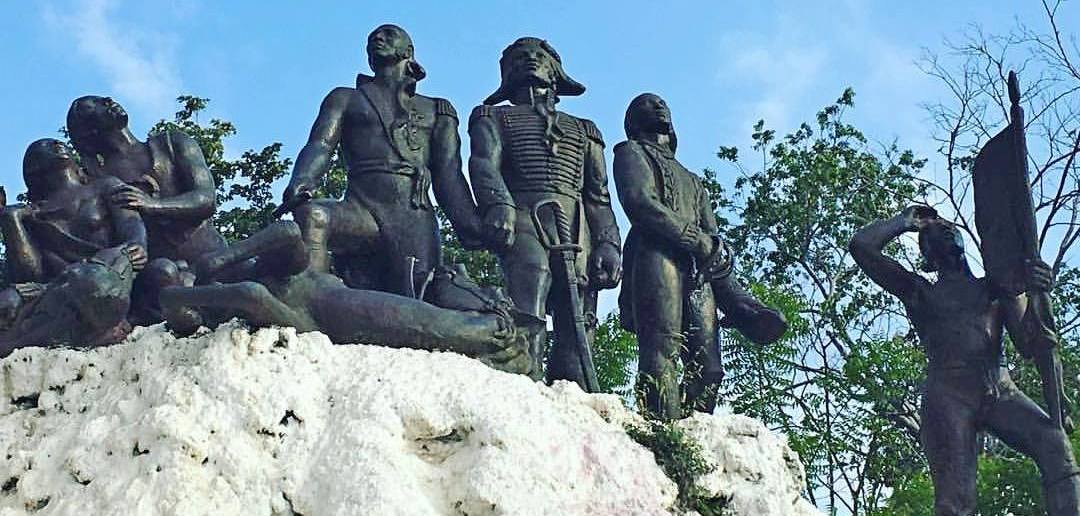
Monument in Cap Haitien dedicated to those
who fought in the Battle of Vertières in
November 1803, the decisive
conflict of the Haitian revolution.
January 1, 2017 marked the 213th anniversary of the Haitian Revolution. Beginning in 1791, the organized resistance of the enslaved peoples of the French colony of Saint-Domingue took hold and eventually overthrew both slavery and colonial rule. The revolutionaries led by Toussaint L'Ouverture and Jean-Jacques Dessalines fought off successive European powers -- the French, Spanish and British -- to proudly establish their independent republic, Haiti, in 1804.
The Haitian Revolution was an earth-shattering development in the struggle for the emancipation of labour all over the world and the establishment of citizenship rights on a modern basis, namely that they belong to people by virtue of their being human as members of a body politic. Haiti's decisive break from the conception of rights of the colonial powers based on the ownership of property and a system of privileges was a great contribution to the liberation struggles of all peoples. This outstanding achievement of the Haitian people looms large in their continued fight to defend their sovereignty and independence and bring into being new arrangements that affirm their rights.
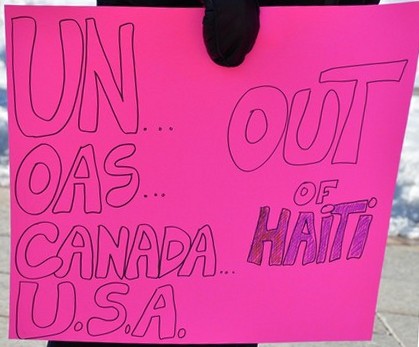
It is a testament to this achievement that, after more than 213 years, the imperialist powers are still unable to suppress the Haitian people's resistance and striving for empowerment. From 1804 to the present, the efforts of the colonial and imperial powers to wreak vengeance on the Haitian nation-building project have only intensified. They have sought to once against enslave the people so their historic example cannot inspire other nations and peoples in their struggles against slavery, colonialism and imperialism. Over the past year, as in the years before, Haitians boldly defied all the predatory forces from the U.S., France, Canada and elsewhere claiming to be for civilization and democracy.
2016 was marked by continuing opposition to the foreign occupation of Haiti and a heroic resistance struggle of the Haitian people against a corrupt, foreign-sponsored electoral process imposed and financed by the U.S. imperialists.[1] From October 2015 to November 2016, the imperialists were unable to impose a President on Haiti and attempts to do so amidst widespread electoral fraud and the marginalization of the vast majority of Haitians were blocked.
The previous fraudulent vote, on October 25, 2015, in
which
participation of registered voters was only 29 per cent, had to
be thrown out after the people refused to accept it and new
elections were scheduled for January 24. Mass mobilizations of
Haitians declared "Nou Pap Obeyi!" ("We Will Not Obey!") and
demanded the complete cancellation of the elections following the
discovery of massive fraud in previous rounds of voting. By this
time, the U.S. had already spent $33 million to secure a
president, while Canada paid $11 million and additional funds had
come from the European Union, while all three sent "observers" who
declared that the process was "clean by Haitian standards."

In January 2016 Haitians declared "Nou Pap Obeyi!" -- "We Will Not
Obey!"
On January 22, the elections were postponed indefinitely. In February, Michel Martelly, who was imposed as president by U.S. Secretary of State Hillary Clinton was forced to resign and an interim president was selected.[2]
The U.S., Canada, France and others demanded that new
elections be held as soon as possible. After more
foreign-sponsored elections were called for April 24 and again
cancelled due to the people's resistance, Canada's Minister of
Foreign Affairs Stéphane Dion declared, "Canada deplores the
fact
that the elections ... have been cancelled for the third time."
Canada and the U.S. announced the suspension of all funding for
Haitian elections until they were carried out as demanded.
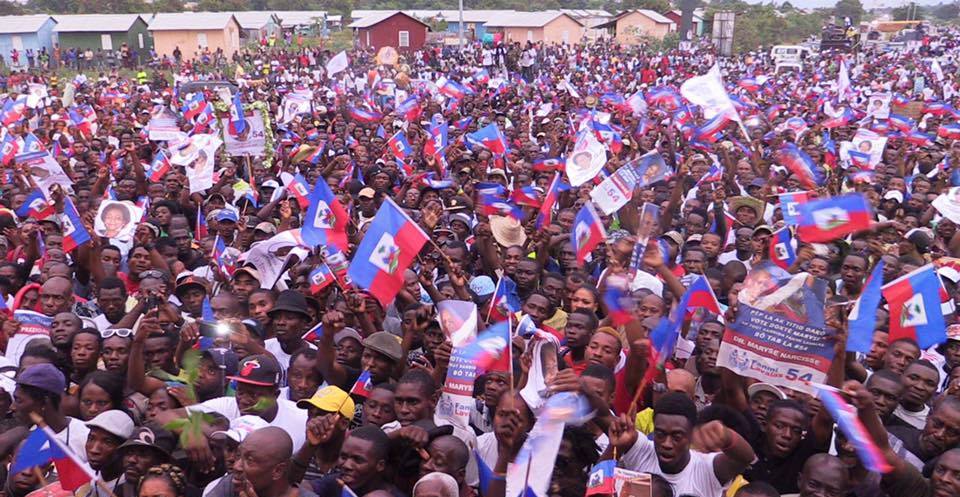
Haitians in the streets on the eve of the November 20, 2016 election.
|
|
Without addressing the serious concerns of Haitians a new election was called for October, but was postponed due to Hurricane Matthew. The new presidential vote was eventually held November 20. In a statement issued on November 19, on the eve of the vote, Foreign Minister Dion declared that Canada "recently dispatched more police officers to serve in the United Nations Stabilization Mission in Haiti [MINUSTAH] in order to beef up security" during the election.
The election saw a record low voter turnout of 21 per cent of registered voters, which dropped to 17 per cent when only valid votes were counted, while registered voters already number only 1 million out of more than 6 million eligible. The favoured candidate of the imperialists, an owner of banana plantations, was declared the winner. All other parties declared the result to be invalid and filed formal objections, pointing out widespread irregularities and questionable numbers. Despite this, on January 4 the Haitian Provisional Electoral Council declared that there was "no massive fraud in the election" and the results upheld.
In its response to the electoral council declaring a
winner,
the U.S. State Department called the election "a positive step
for the full restoration of that nation's democratic
institutions" and urged "all actors to accept the final
results..." A statement of the Core Group, the main countries
occupying Haiti militarily including the U.S., Canada and France
"encourages all actors to respect the final results and to work
constructively toward the peaceful completion of the electoral
cycle." On January 5, Foreign Affairs Minister Dion and Minister of
International Development and La Francophonie Marie-Claude Bibeau said
on behalf of Canada that the vote of a small minority of the population
marked a "return to constitutional order." Dion and Bibeau said, "It is
essential that the Haitian political actors respect the definitive
results of the presidential election, avoid any and all incitement to
violence and work together to ensure the stability of their nation and
prosperity for all Haitians."
Haitians continue to mobilize in their thousands and
tens of
thousands in consecutive daily protests to denounce the electoral
coup as well as the illegitimate, foreign-sponsored electoral
process rejected by 80 per cent of the Haitian electorate. Their
heroic resistance blazes the same path of the indomitable Haitian
revolutionaries and all who defended their historic victory for
rights and liberty. As they fight anew on the anniversary of
their extraordinary achievement, TML Weekly sends its
militant revolutionary greetings to the heroic people of Haiti
and all those in the diaspora, including those who are part of
the ranks of the Canadian and Quebec working class. The continued
attempts to undo the verdict written in the blood of the Haitian
people 213 years ago by the U.S. and other foreign powers attest
to the profound racism and inhumanity of the imperialists and the
need to settle scores with them once and for all.
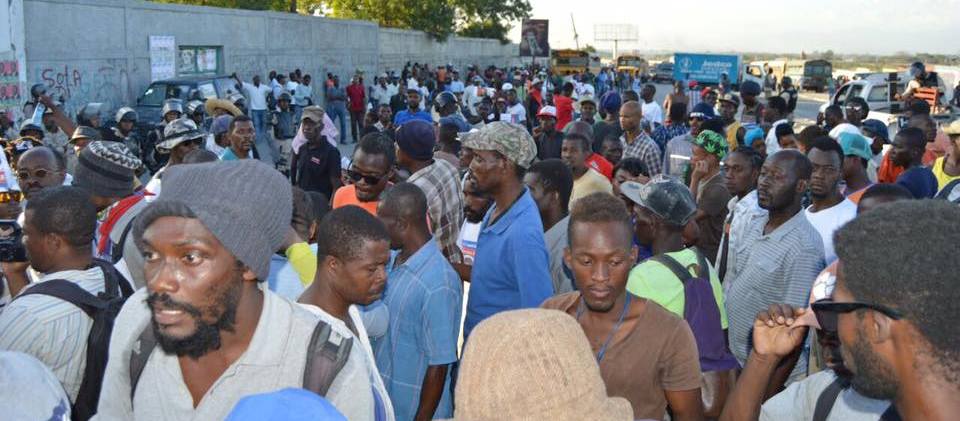
December 24, 2016

December 16, 2016
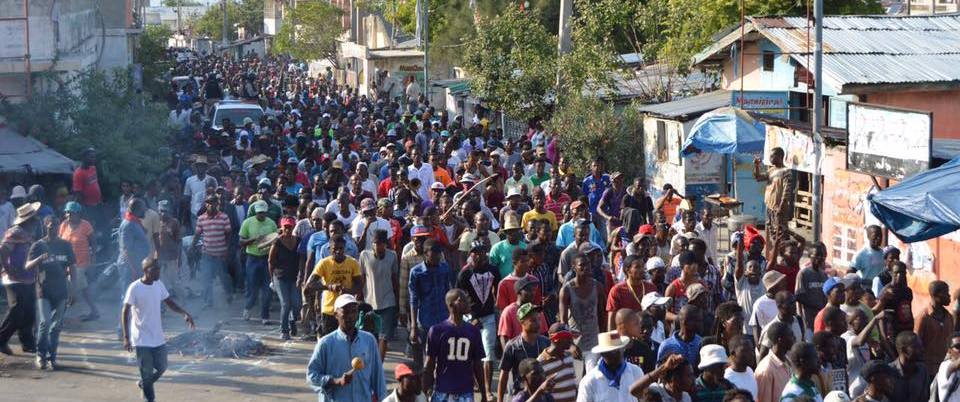
December 2, 2016
Notes
1. In the November 2000 presidential election, the candidate of the social movement Fanmi Lavalas, Jean-Bertrand Aristide won with 92 per cent of votes and a 50 per cent voter turnout. Among the measures taken by Aristide were significant increases in Haiti's minimum wage, the construction of many new schools, and demands for repayment of debts owed to Haiti by colonial powers. In response, the U.S., European Union and Canada imposed sanctions against the Haitian government. In 2003, the Paul Martin Liberal government hosted a "diplomatic" event called the Ottawa Initiative on Haiti in which representatives from the U.S., France, Canada and the Organization of American States agreed on the need to remove Aristide and put Haiti under "trusteeship." In February 2004, one year after the Ottawa meeting, Canadian troops took over the Port-au-Prince airport while U.S. marines kidnapped Aristide and removed him from the country. Since that time, Haitian elections have been conducted under foreign military occupation (now under the auspices of a UN Stabilization Mission, MINUSTAH) with the people and their organizations subjected to severe repression.
2. In an e-mail exchange in January 2011 while Hillary Clinton was in Haiti on U.S. State Department business, her Counselor and Chief of Staff Cheryl Mills advised: "You need to counter what appears to be a building up and potential unifying of oppositon [sic] parties ... The ["international community"] and [U.S. government] taking hits and looking like villan [sic]. Nationalism views on rise. [Clinton] was specifically criticized today for imposing this solution and pressuring [then-President René Préval]." In particular, Mills advised Clinton to "ensure that different elements of haitian society (church leaders, business, etc) buy into the mms [Michel Martelly] solution and are out there on radio messaging why its good."
(With files from Haiti Libre. Photos: M. Narcisse, Haiti Info Project.)
Readers Note
TML Weekly will publish irregularly until February 4. During this time, we encourage you to read and share the TML Daily 2016 Photo Review and to review the experience of the past year. Please continue to send your views, reports and photos.
Readers are also encouraged to support the publication
of TML Weekly by making a financial contribution to the
Marxist-Leninist Party of Canada.*
With best wishes for your work in the New Year,
- TML Weekly Editorial and Technical Staff
* To donate by mail, send cheque or money order
payable
to: MLPC. Send to: P.O. Box 666, Postal Station C, Montreal,
Quebec H2L 4L5. Please include full name and address for
contributions over $20, as the MLPC will issue a tax receipt. The
maximum contribution to a registered political party permitted by
law in 2017 is $1,550.00.
Website: www.cpcml.ca Email: editor@cpcml.ca

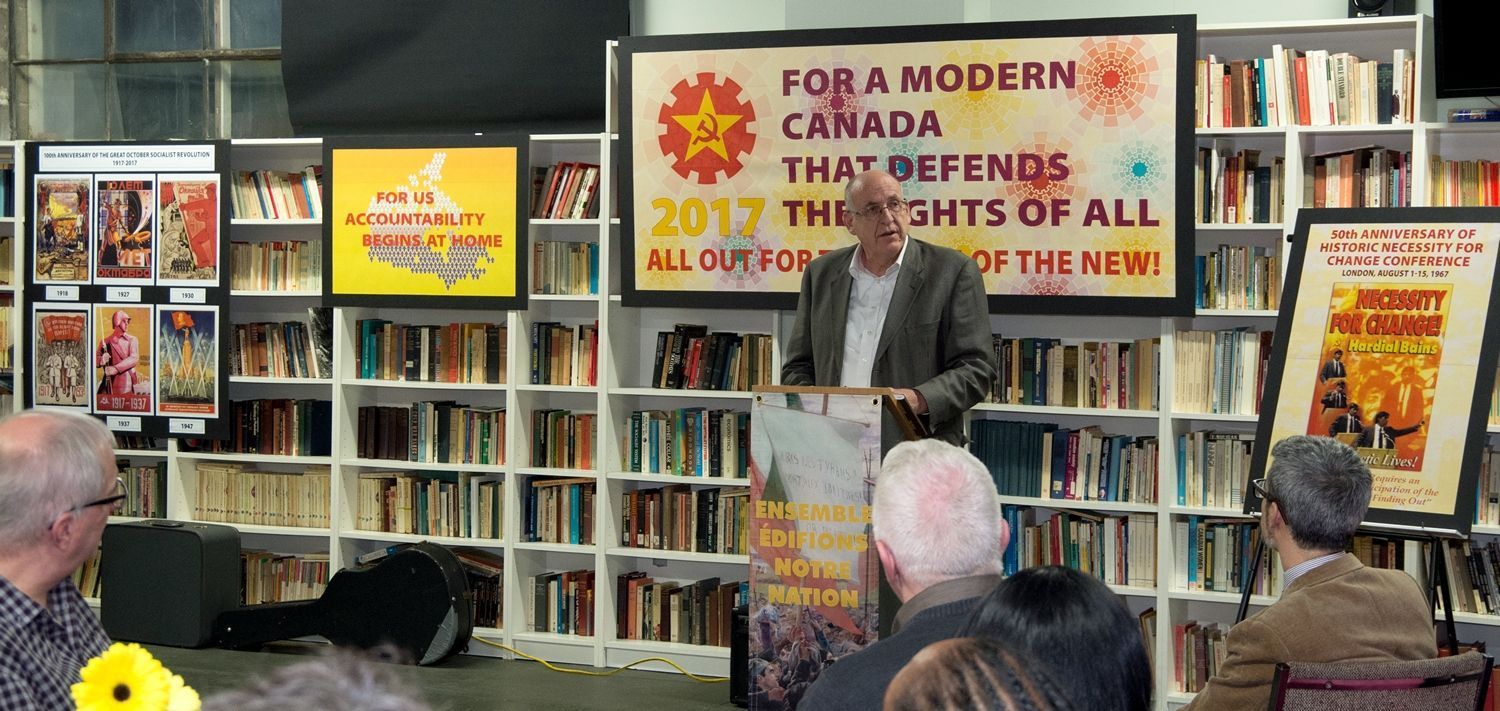
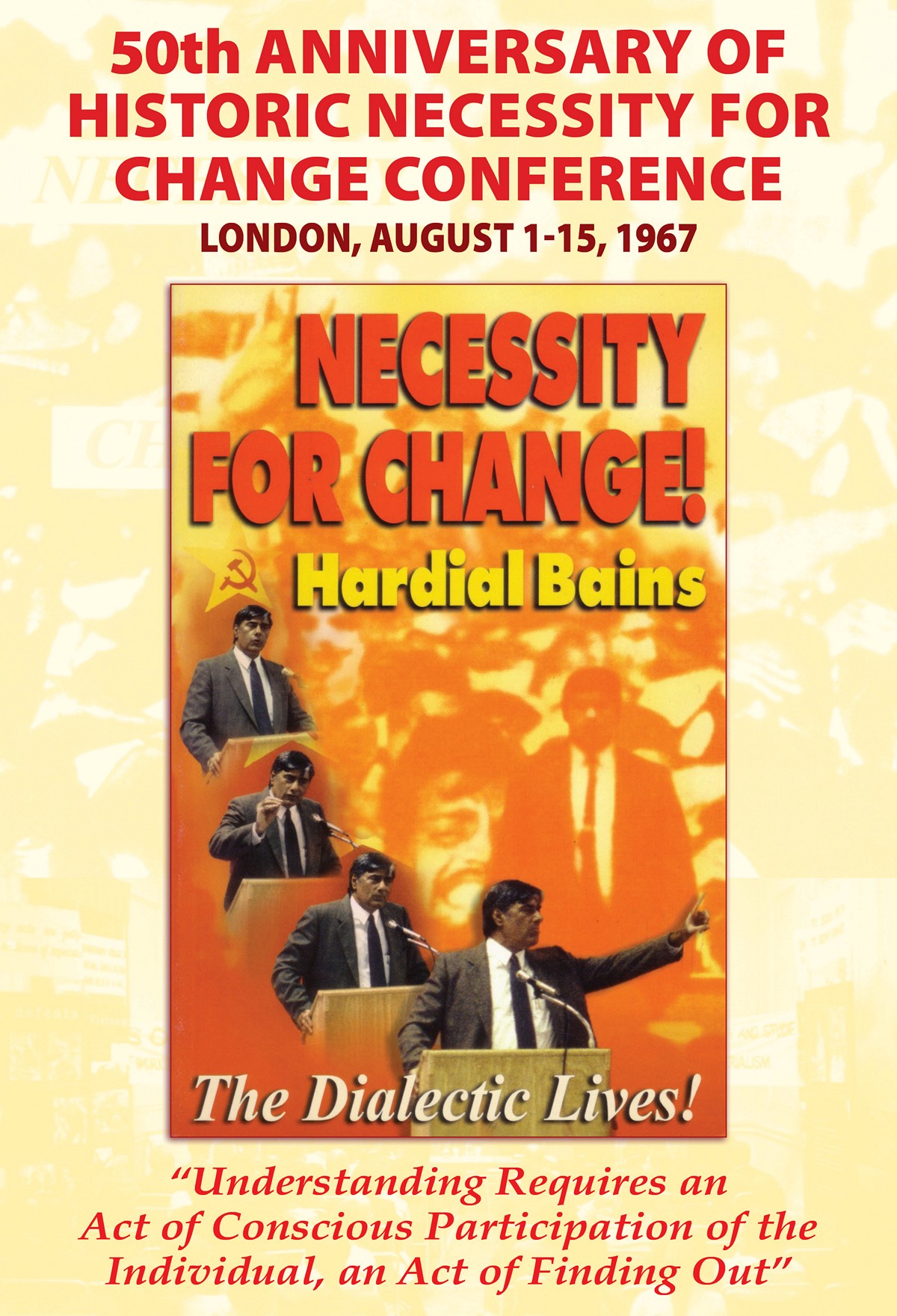 Of significance to CPC(M-L) in 2017 is the
celebration of the
50th anniversary of the Necessity for Change Analysis adopted in
August 1967, on which CPC(M-L) was later founded. Today, culture
in ideological, social and material form remains at the centre of
our attention so as to provide the necessary guide to action to
Build the New. The Party will also review the work in the 1992
period to engage everyone in democratic renewal to provide
guidelines for working people to build modern institutions based
on recognizing and defending rights on a modern basis. This work
was consolidated in 1995 when the Party launched its
nation-building Historic Initiative and will be reconsolidated
this year within the preparations for the Party's Ninth
Congress.
Of significance to CPC(M-L) in 2017 is the
celebration of the
50th anniversary of the Necessity for Change Analysis adopted in
August 1967, on which CPC(M-L) was later founded. Today, culture
in ideological, social and material form remains at the centre of
our attention so as to provide the necessary guide to action to
Build the New. The Party will also review the work in the 1992
period to engage everyone in democratic renewal to provide
guidelines for working people to build modern institutions based
on recognizing and defending rights on a modern basis. This work
was consolidated in 1995 when the Party launched its
nation-building Historic Initiative and will be reconsolidated
this year within the preparations for the Party's Ninth
Congress.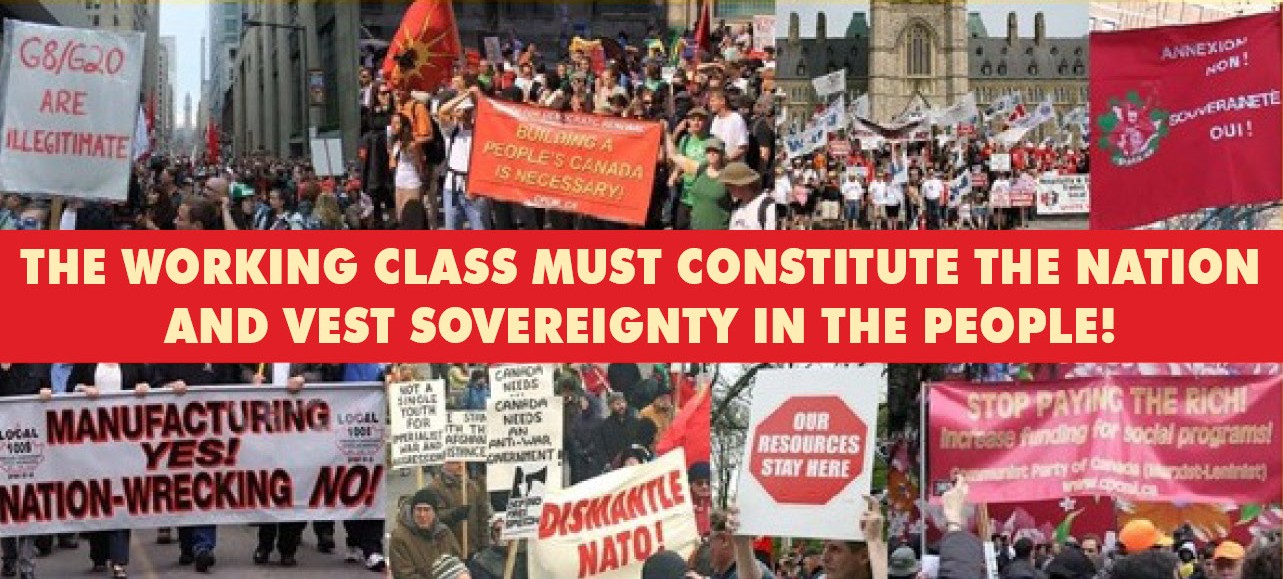
 While appropriating what is
best from the past,
Marxist-Leninists have the responsibility to find solutions to
the complicated problems of the present. Only communists can lead
the society on the high road of civilization. The entire history
from the early nineteenth century to the present proves this
conclusively. Only communists can invoke and bring forth the
theories and human emotions and conceptions necessary to open the
path for the progress of society.
While appropriating what is
best from the past,
Marxist-Leninists have the responsibility to find solutions to
the complicated problems of the present. Only communists can lead
the society on the high road of civilization. The entire history
from the early nineteenth century to the present proves this
conclusively. Only communists can invoke and bring forth the
theories and human emotions and conceptions necessary to open the
path for the progress of society.
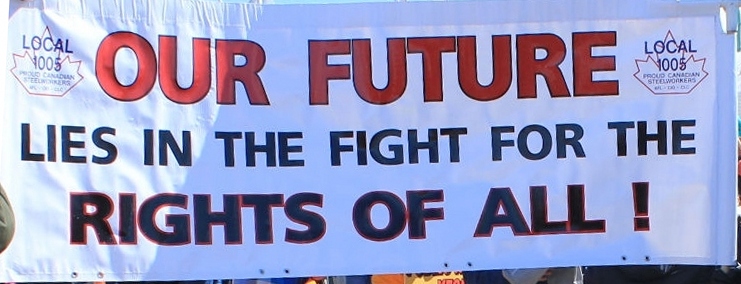
 The example of Stelco jumps
out as an example of the
obstructionism of the oligarchs and their denial of the reality
that the economy needs a new direction. The sole reason the
oligarchs put the Stelco steelworks into state-organized
bankruptcy protection was to attack the rights of the
steelworkers, salaried employees and steel communities. The only
issue within the state-organized bankruptcy process is to deprive
steelworkers of what belongs to them by right -- their wages,
benefits and pensions -- and to deny any responsibility towards
society and the social and natural environment.
The example of Stelco jumps
out as an example of the
obstructionism of the oligarchs and their denial of the reality
that the economy needs a new direction. The sole reason the
oligarchs put the Stelco steelworks into state-organized
bankruptcy protection was to attack the rights of the
steelworkers, salaried employees and steel communities. The only
issue within the state-organized bankruptcy process is to deprive
steelworkers of what belongs to them by right -- their wages,
benefits and pensions -- and to deny any responsibility towards
society and the social and natural environment. The founder of CPC(M-L),
Hardial Bains, taught the working
class in his thesis on the four levels of work that internal
consolidation develops in lockstep with external strength. From
acts of conscious participation to build the headquarters and
institutions of the working class and to defend the rights of all
with actions with analysis arise the understanding, the great
leaps of thinking and theory necessary to lead any profound
movement for change, and to defend its purity against the attacks
of the oligarchs and their political representatives from the
fascist right and imperialist liberal left.
The founder of CPC(M-L),
Hardial Bains, taught the working
class in his thesis on the four levels of work that internal
consolidation develops in lockstep with external strength. From
acts of conscious participation to build the headquarters and
institutions of the working class and to defend the rights of all
with actions with analysis arise the understanding, the great
leaps of thinking and theory necessary to lead any profound
movement for change, and to defend its purity against the attacks
of the oligarchs and their political representatives from the
fascist right and imperialist liberal left.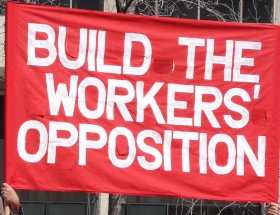 The working class worldview
and voice presenting its own
activities in defence of rights and for democratic renewal and
analysis of events are necessary to combat government of police
powers and its attempt to disinform the polity, to make sure no
political movement exists which serves its own aim. The
independent outlook of the workers' opposition is capable of
giving Canadians the peace of mind and stability from which they
can find their bearings under all situations. With their own
independent positions in opposition to the ruling oligarchs,
workers can advance their struggle and practical politics in
defence of their rights and for democratic renewal in the face of
the provocations and criminalization of conscience by government
of police powers.
The working class worldview
and voice presenting its own
activities in defence of rights and for democratic renewal and
analysis of events are necessary to combat government of police
powers and its attempt to disinform the polity, to make sure no
political movement exists which serves its own aim. The
independent outlook of the workers' opposition is capable of
giving Canadians the peace of mind and stability from which they
can find their bearings under all situations. With their own
independent positions in opposition to the ruling oligarchs,
workers can advance their struggle and practical politics in
defence of their rights and for democratic renewal in the face of
the provocations and criminalization of conscience by government
of police powers. The National Office will
spearhead the work for political
renewal and a modern constitution. The Office will also oversee
membership campaigns and communications with members and the
public. It will issue Renewal Update and regular releases
from the MLPC concerning national and international developments.
As well, the Office will facilitate research and education,
including online seminars, and strengthen the Party's
audio/visual media activity besides other assigned
responsibilities. The Office itself and the equipment needed to
carry out its tasks such as computers, software and furniture,
and the general overhead and contract work all require financing.
As always with Party projects, the expenditures demand
fundraising.
The National Office will
spearhead the work for political
renewal and a modern constitution. The Office will also oversee
membership campaigns and communications with members and the
public. It will issue Renewal Update and regular releases
from the MLPC concerning national and international developments.
As well, the Office will facilitate research and education,
including online seminars, and strengthen the Party's
audio/visual media activity besides other assigned
responsibilities. The Office itself and the equipment needed to
carry out its tasks such as computers, software and furniture,
and the general overhead and contract work all require financing.
As always with Party projects, the expenditures demand
fundraising.